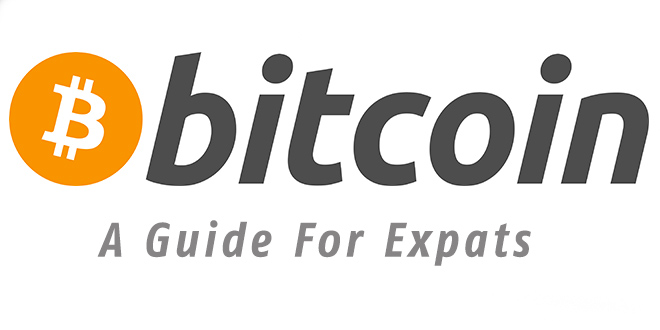Unless you have been living under a rock and have no reason to use the internet you will not have escaped the long-fingered reach of the Bitcoin phenomenon.
A form of digital currency, Bitcoins have been around since 2008 and have become a global method of payment for services and goods.
With over 100,000 merchants worldwide now accepting the Bitcoin, this guide takes a look at the benefits for expats looking to avoid costly bank fees and charges for foreign currency transactions and exchanges.
What Is Bitcoin?

A Bitcoin Guide for Expats
Created by an anonymous group of programmers in 2008, the Bitcoin has been likened to ancient forms of currency put to use in the modern, technologically enabled world. Traditional forms of currency are based on the intrinsic value of a commodity (usually gold or silver) for which notes and coins become a representative token.
Every country (or, as is the case with the European Union, group of countries) controls its own currency.
The value of these currencies can vary based on numerous factors that can lead to extreme volatility. Most of these influencers are completely out of the control of the general population who nevertheless suffer or benefit from the fate of the national currency.
From local politics and world affairs to the trading relationships of the domestic and international markets, the security of your money is in the hands of banks, governments and private investors.
Bitcoin is different because it isn’t linked to any financial of government institutions.
Instead, this cryptocurrency isn’t controlled by anyone and isn’t affected by the usual economic drivers like inflation. This makes the value of your Bitcoins far more stable. Current protocols for the Bitcoin currency has limited the number able to be produced to 21 million.
Unlike banks, you can’t just produce more Bitcoins to flood the market and devalue existing currency.
However, Bitcoins are still subject to exchange rate fluctuations just not the same ones that traditionally affect markets. Indeed, the currency has seen periods of incredible volatility that have produced winners and losers when it comes to choosing a time to buy and sell Bitcoins.
The development of the Bitcoin industry has advanced to such a degree that you can now have a Bitcoin debit card which can be loaded using your virtual cash to turn into actual cash. You can use it at cashpoints or regular shops in exactly the same way as you would a normal card making Bitcoin an accessible way to spend money.
What are the benefits of using Bitcoins for expats?
So why should you be interested in using Bitcoins?
There are actually quite a few very good reasons why using Bitcoins abroad can be a good idea.
Universal Access
The ability to be able to send and receive money anywhere in the world isn’t unique to Bitcoin as you can do so using Western Union, PayPal and international bank transfer; however, it is the combination of the cheap and easy access by which you can do this that gives Bitcoin the edge.
Security
When you register for a Bitcoin account you don’t need to store personal information so though the transaction for the currency are available to view on the public domain, there is no link between your Bitcoin address and you or your personal data.
And, unlike credit cards, Bitcoins were actually designed with security in mind so, when you make a transaction online you aren’t risking your personal and financial information. It relies on a two-key verification system which is incredibly secure.
Bitcoins are impossible to forge which is why so many companies are beginning to take up the currency as a mainstream form of payment.
Cheap
Transactions using Bitcoins do not attract the same level of fees charged by banks and in most cases, are not subject to any at all.
Safe
Your Bitcoin money is yours and may not be taken away. Unlike banks and mainstream payment methods like PayPal or Apple Pay, your account cannot be frozen or your money taken from you.
Fast
Unlike international bank transfers or cheques, Bitcoin transactions occur in under 10 minutes making them a fast way to move money when you are abroad.
Better Exchange Rates
You can sell your Bitcoins locally to purchase currency and the exchange rates are usually far better than those you can achieve at any high street Forex.
Ease of Use
A lot of major companies now accept Bitcoin as a form of payment for their goods and services so you don’t even have to consider exchange rates at all. Big names such as Expedia, Subway, Sears, Microsoft and Apple all accept the currency as well as thousands of merchants, small and large.
Instant Accessibility
Because Bitcoin isn’t a bricks and mortar institute your money is 24/7, 365 days a year. You don’t have to wait until Monday mornings to initiate transfers and Bank Holidays in your local area are a thing of the past.
Discounts
Thanks to Bitcoin wallet companies such as Purse.io, users can also access discounts using their Bitcoin accounts on their apps. Purse are currently offering a 15% discount on anything purchased on Amazon along with an average 20% discount across their other affiliate merchants.
Digital Identification
Most Bitcoin exchange companies also offer digital authentication services such as ID check using advanced verification processes. Confirming your identity is a requirement for some kinds of transactions and the digital ID service provided can circumvent the need to take your passport along to local solicitors to be notarised.
How to Use Bitcoins
To use Bitcoins you first need to locate your local Bitcoin exchange using the Bitcoin website or by going direct.
You will need to register a Bitcoin account by using an email address that you can verify.
Once registered you then need to set up the two-stage verification process which keeps your account secure; this is achieved by downloading an app such as Google Authenticator.
Once your account is set-up you simply purchase the bitcoins you require using your credit or debit card or alternative methods such as GiroPay, Skrill, Neteller, SEPA or OBT.
You can also purchase and trade Bitcoins with individuals as well as other marketplaces.
To spend your coins online, you simply need to complete your transaction as normal but you will be directed to a secure authentication process to complete the purchase.
Alternatively, you can use an online Bitcoin wallet accessible via on your phone or computer. Once again, requiring two step authentication, you transact the purchase using your phone (or computer wallet) instead of a card. Your data is encrypted using your personal key and is considered to be more secure than other forms of digital transactions.
If you choose to have a Bitcoin debit or credit card then these are used with chip and pin exactly as you would with traditional cards.
There are also Bitcoin cash-exchanges which allow you to withdraw cash in local currency using your Bitcoin account without the need for a specific card to do so.
Bitcoins: The Legal Bit
Understandably the ease of use and potential for evasion of traditional taxation makes Bitcoin a real headache for government agencies who want to legislate (and ultimately levy taxes on) the use of Bitcoins.
If you don’t look at the simple revenue benefits for governments, there is a concern about the use of Bitcoin as a means of money laundering. Because of the fact that Bitcoin is used anonymously the potential scope for the currency being used as a haven for criminal activity is huge.
In most countries you are required to report any Bitcoin activities as you would any other source of income for the purposes of tax returns.
However, it is important that you check the legal implications of using Bitcoins in your host country; some countries ignore the currency completely whilst others have instigated an outright ban on Bitcoin.
The Bitcoin Revolution: In Summary

With any new currency, volatility is the biggest teething problem; as uptake varies the supply and demand influences the rate more sharply.
However, the rate of development of the Bitcoin has grown momentum over the last 18 months and it is likely that these sharp rises and falls will gradually level out making the Bitcoin a far more stable global currency.
There are good and bad points in adopting the Bitcoin and only you can be the judge as to whether it will be useful to you in your particular set of circumstances but, to help you make a decision, here are the pros and cons in a nutshell.
Bitcoin: Pros
- It’s fast
- It’s cheap with lower fees than traditional methods of foreign currency transactions.
- It’s more secure than other forms of payment, particularly online.
- It’s safe and secure.
- 100,000 places to use it.
- Prevents ID theft and fraud.
- All transactions are stored and verifiable.
Bitcoin: Cons
- Potential added complications to tax returns.
- Not accepted everywhere.
- Volatile exchange rates.
- Some countries have restrictions on its use.
- Relatively new technology.
- Potential for illicit activity.
What do you make of the Bitcoin craze?
Short term fad or long term trend?




